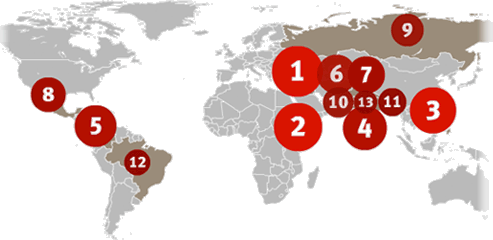Local and international journalists faced persistent, deadly violence, with both targeted murders and crossfire killings reported. Four soldiers with the African Union peacekeeping mission fired on a Malaysian humanitarian aid convoy in September, killing one journalist and injuring another. The AU mission in Somalia suspended the soldiers and returned them to their home country of Burundi for potential trial. Despite improved security in the capital, Mogadishu, journalists across the country continued to flee into exile to avoid threats and violence. Al-Shabaab militants and other insurgents continued to shutter independent radio stations in southern and central Somalia. Growing insecurity in the semi-autonomous region of Puntland led to increased attacks and arrests of journalists. In Somaliland, President Ahmed Mahmoud Silyano reneged on his 2010 campaign pledge to uphold press freedom and initiated a series of state-sponsored criminal defamation cases against the region’s private press.
Somalia
» AU forces kill Malaysian journalist; Somalia is region’s deadliest nation.
» Press freedom violations rise in Puntland and Somaliland.
Local and international journalists faced persistent, deadly violence, with both targeted murders and crossfire killings reported. Four soldiers with the African Union peacekeeping mission fired on a Malaysian humanitarian aid convoy in September, killing one journalist and injuring another. The AU mission in Somalia suspended the soldiers and returned them to their home country of Burundi for potential trial. Despite improved security in the capital, Mogadishu, journalists across the country continued to flee into exile to avoid threats and violence. Al-Shabaab militants and other insurgents continued to shutter independent radio stations in southern and central Somalia. Growing insecurity in the semi-autonomous region of Puntland led to increased attacks and arrests of journalists. In Somaliland, President Ahmed Mahmoud Silyano reneged on his 2010 campaign pledge to uphold press freedom and initiated a series of state- sponsored criminal defamation cases against the region’s private press.
-
2nd
Impunity Index ranking -
68
In exile, 2001-11 -
22
Killed since 2007 -
9
Radio stations shut since 2007 -
7
Defamation cases in Somaliland
With at least 10 unsolved murders of journalists in the last decade, Somalia has the worst rating in Africa and the second worst worldwide in combating deadly attacks on the press, CPJ's Impunity Index shows.

| 1. Iraq 2. Somalia 3. Philippines 4. Sri Lanka | 5. Colombia 6. Afghanistan 7. Nepal 8. Mexico | 9. Russia 10. Pakistan 11. Bangladesh 12. Brazil | 13. India |
Facing threats, attacks, and harassment, Somali journalists have fled the country by the dozens over the past decade, according to CPJ's annual report on exiled journalists. The exodus has decimated the local press corps and left a significant void in coverage seen internationally. Worldwide, only Ethiopian journalists have fled in higher numbers over the past decade, according to CPJ research.
68 Somalia
66 Iran
55 Iraq
49 Zimbabwe
47 Eritrea
25 Sri Lanka
20 Colombia
18 Haiti
18 Rwanda
18 Uzbekistan
17 Gambia
Local and international journalists and media support staff face myriad dangers in a country gripped by violence and instability. Journalists have been murdered or killed in crossfire on a regular basis.
Insurgents, notably militants with Al-Shabaab, have routinely shuttered stations deemed critical of their operations, seizing the properties for use in spreading their own propaganda. A government-allied militia, Ahlu Sunna Wal Jama'a, also seized a radio station.
Despite 2010 campaign pledges to uphold press freedom, Somaliland authorities routinely filed politically motivated criminal defamation complaints to silence critical reporting. Seven cases were filed in 2011 alone, CPJ research shows.
Newspapers targeted in 2011:
Hargeisa Star (three times)
Saxafi
Waheen
Ogaal
Yool
